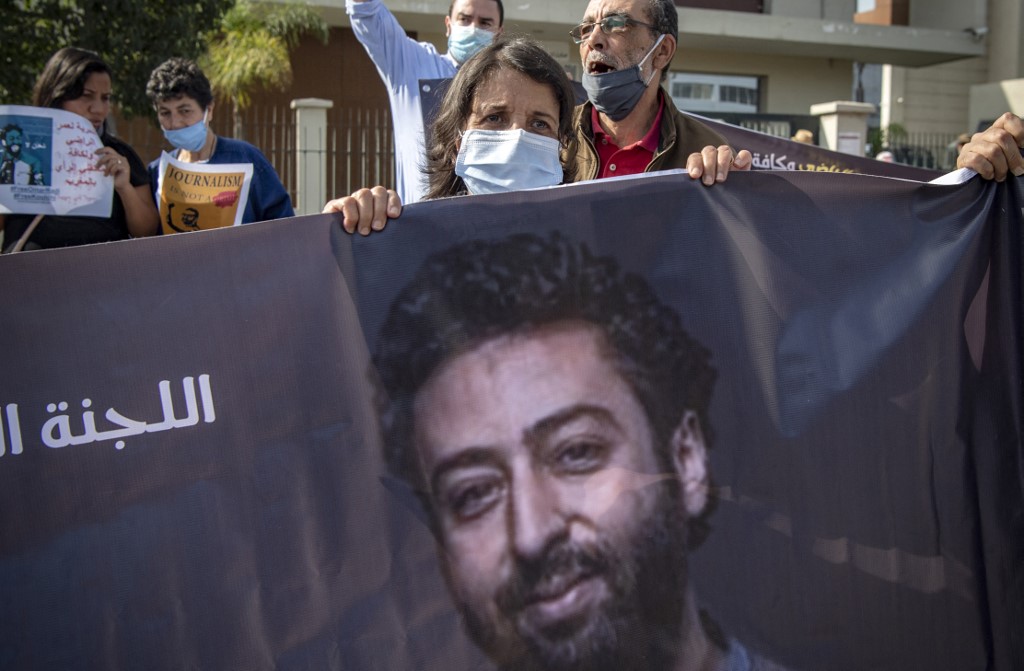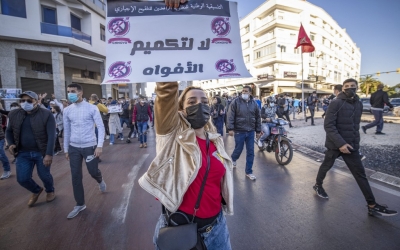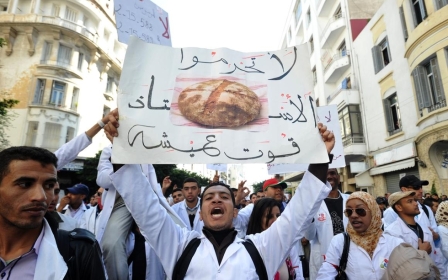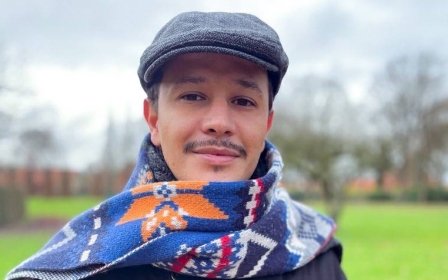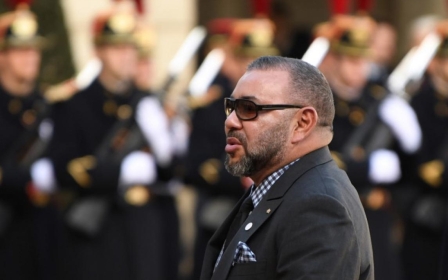Morocco's leap backwards on freedom of speech is a danger to stability

King Mohammed VI of Morocco will brook no opposition, as evidenced by the relentless efforts of the governing elite to silence all opposing voices.
From intellectuals, to human rights activists, to critical journalists, anyone who dares to cross the monarchy’s infamous “red lines” - which include “undermining” the monarchy, the king, Islam, or Morocco’s claim to “territorial integrity” - is liable to be prosecuted.
Earlier this month, more than 40 teachers were given two-month suspended sentences for demonstrating without authorisation in favour of reforming their professional status - a crisis that has crippled public education in Morocco since 2019.
The government uses any means possible to silence its most persistent critics: intimidation, persecution, media lynching, fines, arbitrary detentions and convictions
Also this month, Moroccan journalist and rights activist Omar Radi was sentenced on appeal to six years in prison on espionage and rape charges. Another journalist, Imad Stitou, received a shorter sentence for complicity in the Radi case. And in February, the Moroccan judiciary upheld on appeal a five-year prison sentence against independent journalist Soulaimane Raissouni for sexual assault. All of them deny the charges.
The Raissouni ruling came just as Mohammed Ziane, a lawyer and former human rights minister, was sentenced to three years in prison over a complaint filed by the interior ministry. He was convicted of adultery after accusing security services of faking a video that showed him in a compromising situation.
New MEE newsletter: Jerusalem Dispatch
Sign up to get the latest insights and analysis on Israel-Palestine, alongside Turkey Unpacked and other MEE newsletters
In January, the Moroccan Association for Human Rights reported that the country had experienced “unprecedented regression” in freedom of expression and the media in 2021, citing 170 cases of arrests and trials of journalists, bloggers and social activists. Morocco was ranked 136thout of 180 countries in the 2021 World Press Freedom Index, compiled by Reporters Without Borders.
Scare tactics
King Mohammed VI, like his father before him, was particularly dismissive of Moroccan media outlets at the start of his reign. The rare interviews he deigned to give were granted to international media, and Spanish news agencies in particular.
And yet, his actions as a young monarch seemed to suggest a break with his father’s legacy in terms of rights and freedoms. Dubbed the “king of the poor”, he dismissed the much-feared former interior minister, Driss Basri, and set up an Equity and Reconciliation Commission to investigate human rights abuses committed by the government and high-ranking officials during the "Years of Lead".
What many saw as a harbinger of political reforms to come, however, would ultimately prove to be a clever ploy aimed at securing a peaceful succession to the Alawite throne.
In no time, the new regime would show its true, neo-authoritarian colours, preaching false democracy and extolling the merits of a monarchy tough on radical Islamism - the spectre of which is conveniently brandished every time the regime is caught red-handed violating rights and liberties, especially in the wake of the deadly 2003 attacks in Casablanca.
Such scare tactics have served to validate the regime’s imposition of excessive security measures on both the general population, and on journalists and human rights advocates in particular. Yet, despite proven abuses, Moroccan authorities continue to deny reports of deteriorating rights and freedoms in the kingdom, including the politically motivated prosecutions of regime opponents.
The government uses any means possible to silence its most persistent critics: intimidation, persecution, media assassination, fines, arbitrary detentions and convictions. In the 2000s, the regime did almost everything it could to muzzle the so-called independent press, most of whose pioneers were forced into exile after their publications were banned, often because of wrongful convictions: people such as Aboubakr Jamai, Ali Lmrabet, Ahmed Reda Benchemsi and Hicham Mansouri.
Risk of social collapse
Today, the judiciary still has yet to assert its independence from government, frequently ruling in cases that hinge on cooked-up charges levelled by intelligence services. In recent years, Moroccan authorities have reportedly resorted to allegations and blackmail of a sexual nature in order to silence recalcitrant opponents. In 2007, Islamist artist Rachid Ghoulam was indicted on charges of adultery in a case allegedly orchestrated by intelligence services.
More recently, in 2019, Akhbar al-Yaum publisher Taoufik Bouachrine was sentenced to 15 years in prison on charges of sexual violence, which he denies.
On the human rights front, activist Fouad Abdelmoumni alleges that Moroccan authorities made secret recordings of him sleeping with his partner, and then sent the videos to their relatives’ phones. Moroccan authorities have also targeted anti-regime YouTuber Dounia Filali, accusing her of selling inflatable sex dolls - charges she denies.
Then there were the aforementioned Ziane, Raissouni, Radi and Stitou cases. Verdicts pronounced against rights advocates, independent journalists and intellectuals are proof of the government’s authoritarian bent. The case of Maati Monjib, a historian recently sentenced to a year in prison for fraud and undermining state security, is yet another example. Denying the allegations, he has described security forces as “political police”.
These systematic attacks on free expression are particularly ominous, with the old guard ostensibly embracing Morocco’s shift towards authoritarian rule - a dangerous drift that could lead to social implosion, undermining the facade of political stability touted by official propaganda.
With the kingdom’s socioeconomic indicators in the red and demonstrations multiplying against the high costs of living and social injustices, this is a dangerous game. But one thing is certain: as freedoms in Morocco are increasingly curtailed, the monarchy’s disquiet is becoming increasingly obvious.
The views expressed in this article belong to the author and do not necessarily reflect the editorial policy of Middle East Eye.
This article has been translated and condensed from the MEE French edition.
Middle East Eye delivers independent and unrivalled coverage and analysis of the Middle East, North Africa and beyond. To learn more about republishing this content and the associated fees, please fill out this form. More about MEE can be found here.



